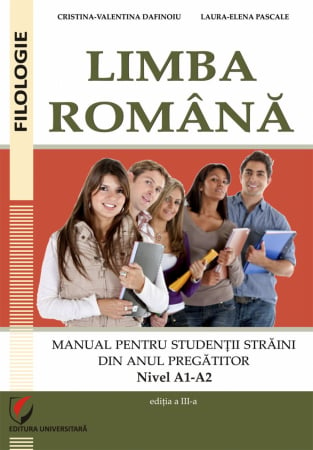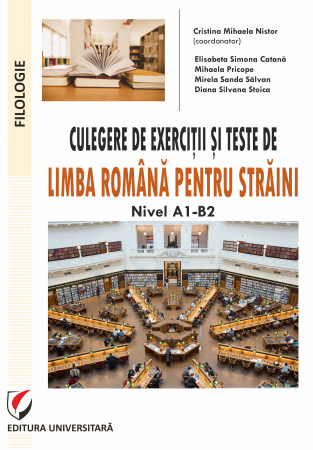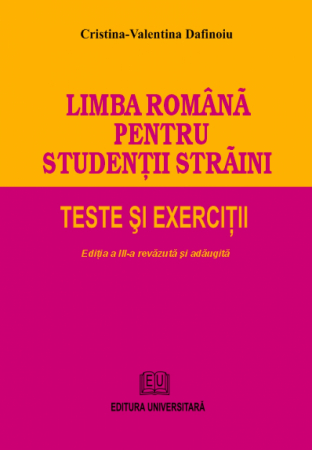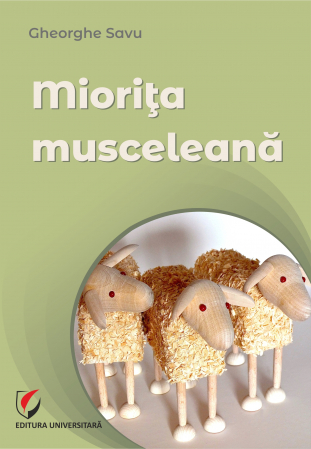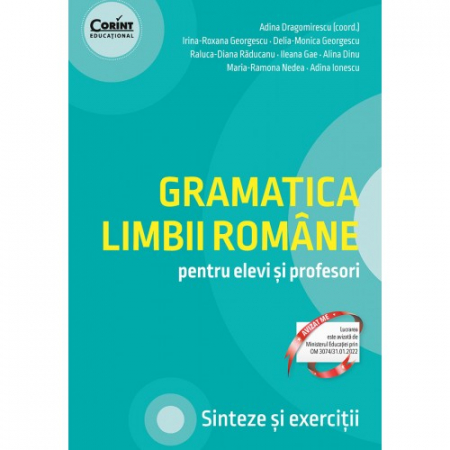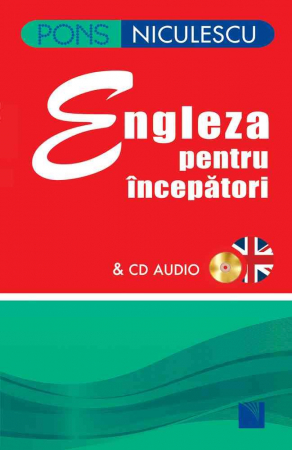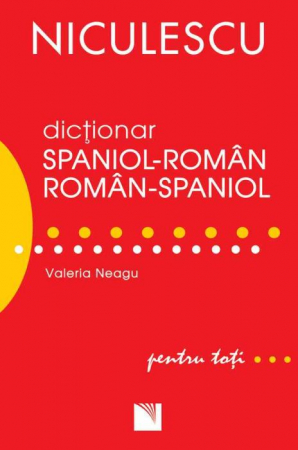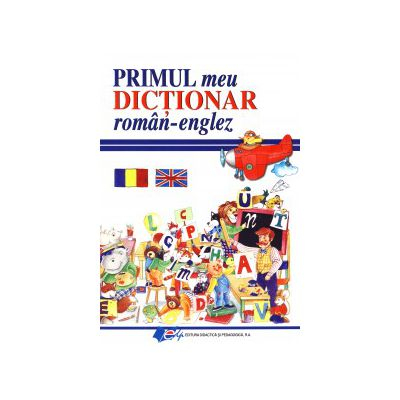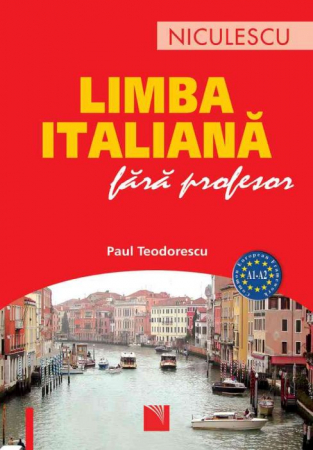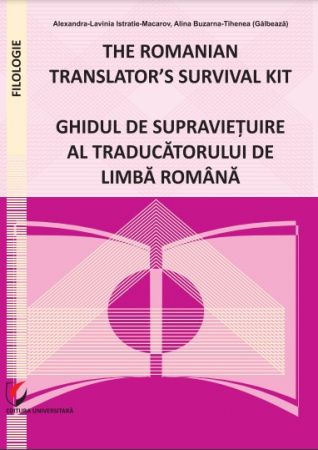Propuneri manuscrise: [email protected]: 0745 204 115
Urmărire comenzi Persoane fizice / Vânzări: 0745 200 357 / Comenzi Persoane juridice: 0721 722 783
6359.png) Literature, economics and politics. Student papers - Dana Radler, Elena Stoican, Teodora Serban-Oprescu
Literature, economics and politics. Student papers - Dana Radler, Elena Stoican, Teodora Serban-Oprescu
6359.png)
Editura: Editura Universitară
Autor: Dana Radler, Elena Stoican, Teodora Serban-Oprescu
Ediția: I
Pagini: 136
Anul publicării: 2023
ISBN: 978-606-28-1626-1
DOI: https://doi.org/10.5682/9786062816261
- Descriere
- Download (1)
- Autori
- Cuprins
- Cuvânt înainte
- Review-uri (0)
The editors
-
Literature, economics and politics. Student papers
Descarcă
ELENA STOICAN
TEODORA SERBAN-OPRESCU
Section 1. Economics, culture and politics / 11
Pizza Hut et Mikhaïl Gorbatchev / 13
Die Hyperinflation in der Weimarer Republik von 1919 bis 1923 / 21
Benedetto Croce – liberale, idealista, attivista / 28
Section 2. Man and destiny in Ernest Hemingway’s works / 45
Hope and Dignity in The Old Man and the Sea / 47
Metamorphoses of Manhood in Hemingway’s “The Short Happy Life of Francis Macomber” / 58
Purpose and Regret of the Author in Hemingway's “The Snows of Kilimanjaro” / 70
Symbolism in Hemingway’s The Old Man and the Sea / 82
Section 3. Ernest Hemingway against interdisciplinary perspectives / 93
The Marketing of the “The Killers” Adaptations / 95
The Social Context in Hemingway’s The Old Man and the Sea / 103
Hemingway’s Iceberg Theory and Its Potential for Business, Politics and Diplomacy / 114
“The Snows of Kilimanjaro”: The Book versus the Film Adaptation / 124
Notes on contributors / 131
Notes on editors / 135
The papers follow three thematic strands: 1) Economics, culture and politics; 2) Man and destiny in Ernest Hemingway’s works, and 3) Ernest Hemingway against interdisciplinary perspectives. This volume covers a total of 11 diverse contributions. In what regards the choice of linguistic expression, authors used English, French, German and Italian, most of the texts being written in English.
The article entitled “Pizza Hut et Mikhail Gorbatchev” by Andreea Marin and Petronela Manea opens the first section. The two discuss a well known example of marketing a Western product into a former communist area. Marin and Manea present the background of this early advertising experience and discuss how the Russian politician supported through his personal appearance the opening of the society towards such products. Continuing the series, Victor Rosca examines the historical context of hyperinflation, more specifically in the Weimar Republic. Drawing on historical and statistical data, the student shows this particular example of a crisis, indicating the foreseeable consequences. While the economic impact remains a difficult and therefore memorable case, the loss in what regards human existence needs to be equally considered. The following contribution to the first part of the present volume is provided by Alexandru Costin Udrea’s paper entitled “Benedetto Croce – liberale, idealista, attivista”. This study proposes an analytical and reflective overview of the Italian philosopher’s and politician’s life, work and achievements. Given Croce’s final success and his position as a champion of democracy and liberty, his influence on Italian politics and worldwide philosophy is evident. The biographical approach of the present work is entwined with the various ideas proposed and activities fulfilled by this personality– for the better of our world, and for its peace.
Ana Banu opens the second grouping dedicated to man and destiny as emerging in Hemingway’s fiction. Her paper entitled “Hope and Dignity in The Old Man and the Sea” draws a captivating parallel between the main character of Hemingway’s The Old Man and the Sea, Santiago, and Virgil’s hero Aeneas of the Aeneid. The argument offers an original interpretation of the concepts of hope and dignity in relation to the themes of honour, death, nobility and cruelty that surface in the old fisherman’s struggle with the impressive forces of nature. The section continues with Alexandru Costin Udrea’s contribution “Metamorphoses of Manhood in Hemingway’s ‘The Short Happy Life of Francis Macomber’”, which introduces an insightful comparative analysis of contrasting versions of manhood in the context of hunting practices, as illustrated by the conflicting relation between the two male protagonists of Hemingway’s short story, namely, Francis Macomber and Robert Wilson. Alexandru Matei Enache continues this series of reflections with the paper entitled “The Purpose and Regret of the Author in Hemingway's ‘The Snows of Kilimanjaro’”, which argues for an autobiographical connection between the protagonist’s (Harry) destiny and Hemingway’s own fate; more specifically, the paper focuses on Harry’s sense of failure as a writer rendered through a modernist narrative technique, (the stream of consciousness), which enables retrospective glances and bitter re evaluations of his choices. The idea of man and destiny is also reflected in Adina Paun’s paper, “Symbolism in Hemingway’s The Old Man and the Sea”, which relies on a close reading of Hemingway’s text. Carefully selecting relevant quotes from the original text, the author discusses several symbols (i.e. the sea, the fish) and metaphors (the Crucifixion, the idea of transgression), foregrounding the expressiveness of Hemingway’s apparent stylistic simplicity and decoding/ identifying valuable life lessons Santiago’s attitude at sea.
The third and final series focuses on interdisciplinary perspectives connected to Hemingway’s works. Adrian Ciprian Draghici and Daniela Dodenciu present their paper entitled “The Marketing of Hemingway’s ‘The Killers’”. Looking at various posters of adaptations inspired by Hemingway’s work, their article focuses on elements specific to multimodal narrative: both visual and text message. While most of the discussed examples share typical characteristics, such as the use of vibrant colours, main protagonists presented in diverse physical postures and the use of capital letters, all of them equally have suggestive differentiations in what regards the position of the actors on the poster, such as the ranges of colours and shades or how the text was placed in relation with the graphic element. Iulia Ilinca and Ioana Maria Radu Antonescu examine the human relationships described in The Old Man and the Sea, as well as those between the protagonists and the natural environment in either calm or difficult moments, or longer versus shorter intervals. In this sense, Santiago’s perception of the sea is as close as another human being, which explains why the vast water is personified. The man’s view upon nature is, on the other hand, strongly related to the popular beliefs of his time.
Cristian Schiopu continues this interdisciplinary discussion with an original contribution entitled “Hemingway’s Iceberg Theory and its Potential in Business, Politics and Diplomacy”. The author’s approach goes beyond literary criticism, as it presents Ernest Hemingway’s famous iceberg theory, also known as theory of omission, while also putting forward a proposal for a series of possible applications of this writing technique in fields outside the sphere of literature, such as: political discourse, public relations, business negotiations, diplomacy and foreign policy, as well as part of the deterrence theory used as a military strategy for avoiding crises and conflicts. Alexandru Gabriel Chivu focuses on Hemingway’s “The Snows of Kilimanjaro”, examining the narrative versus the film adaptation in 1952. Drawing on concepts such as materialism and idealism, Chivu discusses the trajectory of main protagonists, their memories and relationships. In his opinion, the film stays as an open and flexible construct, the director including various elements which do not appear in the text.
Taking into consideration the whole range of subjects as well as the type of analysis employed by the young authors, we can affirm that economics and culture grow together as fertile and challenging areas for the last couple of decades. It is not only the diverse types of resources and methods of analysis, be it closer to text, statistical data or multimodal narratives, but also the way teams decided to either work on individually or collaboratively. The number of contributions as well as the effort invested in research and revision confirms the intention of the undergraduates to brush up their academic skills. While this is definitely a premiere in the Department of Modern Languages and Business Communication, we are convinced that it will not be the last. Learning together, learning in formal as well as in informal ways cannot but sustain such outcomes assembled into a collective volume.
Dana Radler
Elena Stoican
Teodora Serban Oprescu

![Literature, economics and politics. Student papers - Dana Radler, Elena Stoican, Teodora Serban-Oprescu [1] Literature, economics and politics. Student papers - Dana Radler, Elena Stoican, Teodora Serban-Oprescu [1]](https://gomagcdn.ro/domains/editurauniversitara.ro/files/product/large/literature-economics-and-politics-student-papers-339982.jpg)
